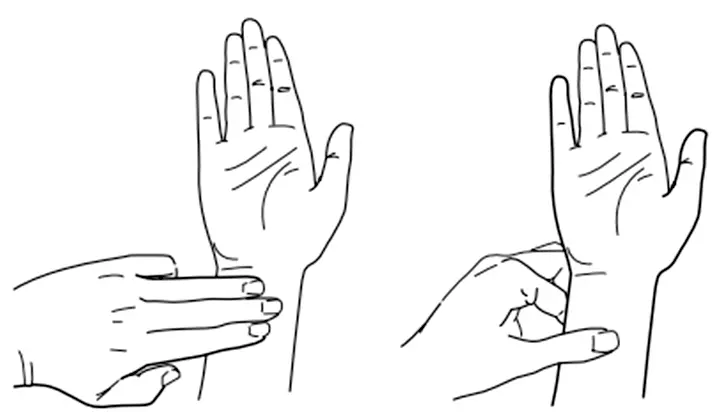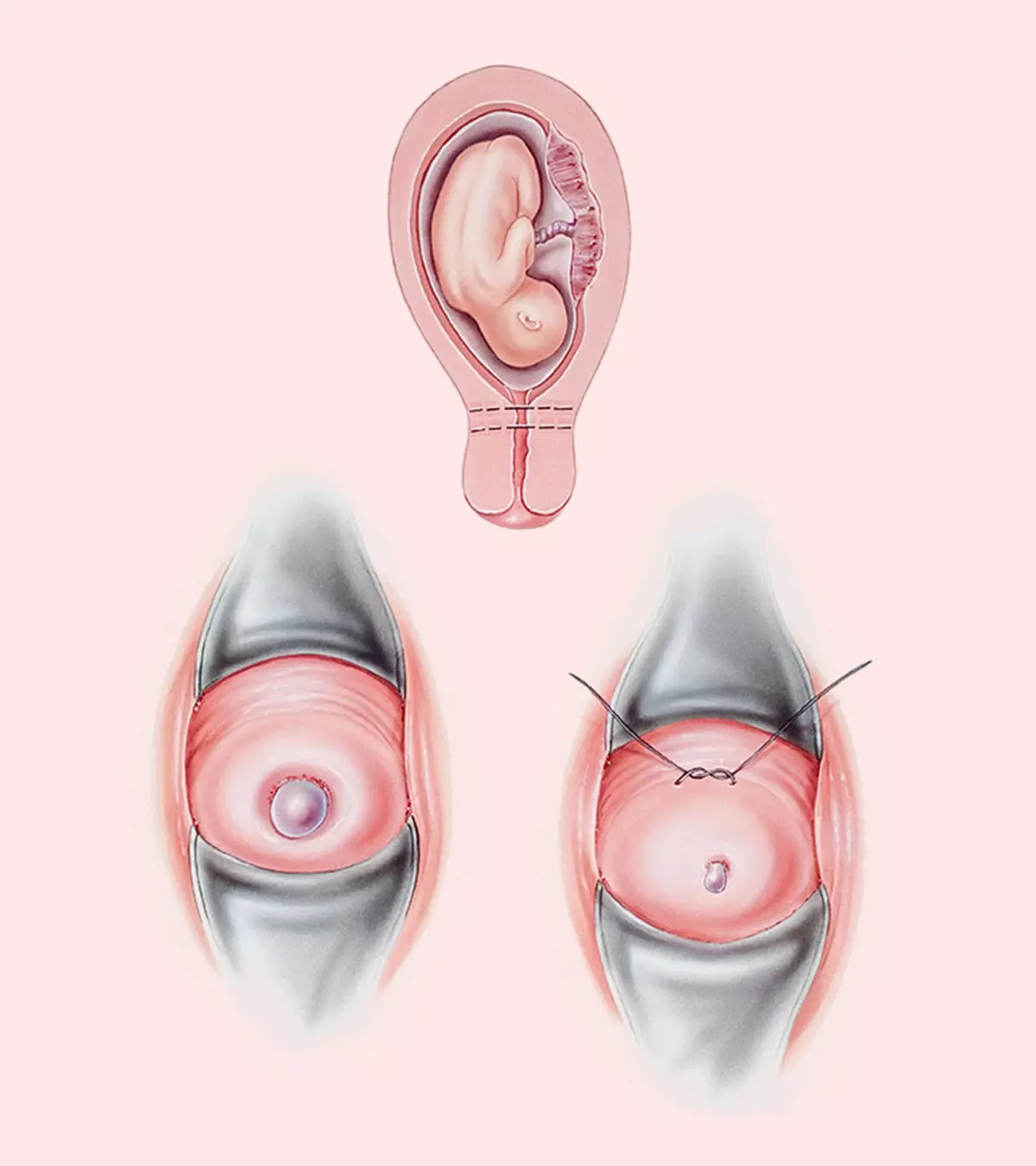
Image: ShutterStock
Vomiting and nausea during pregnancy are commonly referred to as “morning sickness.” It is a common occurrence during pregnancy mainly due to hormonal changes, and despite its name, may occur either during the day or at night. More than 50% of women experience it during their pregnancies. The condition usually starts by the 4th week and goes away by the 16th week. However, if it progressively intensifies into a severe issue, it is called hyperemesis gravidarum (1). According to researchers at multiple institutions, hyperemesis gravidarum (HG) is believed to occur in 0.3 – 10.8% of all pregnancies. You may be prescribed certain medicines or home remedies to cope with it.
Scroll through to know more about pregnancy, nausea, and vomiting.
Key Pointers
- Morning sickness is a common experience of vomiting and nausea in pregnancy.
- Symptoms usually begin by the 4th week and improve by the 16th week.
- If symptoms worsen and become severe, it is called hyperemesis gravidarum.
- There are several natural remedies that can help alleviate morning sickness, such as ginger, peppermint tea, lemon water, vitamin B6, and acupuncture.
- Seeking medical advice is essential if symptoms are severe, including the inability to eat or drink, infrequent or dark urine, dizziness, sudden weight loss, and pain.
How To Stop Nausea And Vomiting During Pregnancy?
During pregnancy, you may experience nausea and vomiting (hyperemesis or emesis gravidarum) along with other symptoms, including loss of appetite, and gastrointestinal disturbances, such as heartburn, indigestion, abdominal discomfort, and acid reflux. In case of severe morning sickness, it may lead to dehydration, weight loss, a fetus’ nutritional deficiencies, and other complications. It may not be possible to stop nausea or vomiting, but you may try to deal with it or control it with the help of some home remedies. However, note that there is a lack of substantial scientific evidence to support the use of most of these remedies. You may try them and continue if they work for you.
1. Water
Keep sipping water frequently (2). It helps replace the lost fluids and reduce frequent bouts of nausea. When you feel thirsty after vomiting, take small sips and not more than half a cup of water at a time (3).
2. Ginger

Ginger helps relieve nausea. You may have it in the form of whole ginger (crushed or juice), candies, chews, and drinks (4). A clinical study has found that the everyday intake of 1,000mg of ginger in capsule form can be effective in reducing nausea and vomiting during pregnancy (5).
3. Lemon
You may sniff a fresh lemon peel or inhale some lemon essential oil taken in a handkerchief whenever you experience queasiness or feel nauseous. A clinical study has shown the efficacy of lemon scent in reducing nausea and vomiting (6). Drinking lemon water may also help. You may add a bit of honey, sugar, or salt for taste and sip it.
Kelsey Selene, a mother of two, shares her secret for relieving nausea during pregnancy. She explains, “In the very beginning, when I had the most nausea, I drank lemon water. I would take a big glass of water, and I would literally take fresh lemons and squeeze like a whole lemon, if not at least half of a lemon, into a big glass of water. For whatever reason, the lemon water totally cut out my nausea. Whenever I was feeling really, really queasy, I would just go drink some of it, and it went away. It was like a miracle drink and was super helpful (i).”
4. Peppermint
A few studies have found that drinking peppermint tea or sucking a peppermint candy has anti-nausea effects (7) (8).
5. Chamomile
Getting a soothing massage with chamomile oil might help. Chamomile tea is also used for relief from morning sickness. However, its efficacy is not scientifically known (9).
6. Vitamin B6
A couple of studies have shown the effectiveness of vitamin B6 in reducing nausea and vomiting. Vitamin B6 supplements are prescribed as a first-line treatment for nausea (10). Eat foods rich in vitamin B6 such as whole grains, low-fat milk products, fat-free products, lean meat, seafood, poultry, nuts, and seeds (11).
 Quick tip
Quick tip7. Acupressure and acupuncture
Alternative therapies, such as acupressure and acupuncture, could help. Applying pressure on a specific point may help reduce nausea. Studies have reported that stimulation of the P6 (Nei Guan) point may reduce the severity and frequency of vomiting during pregnancy. This point is located at about three finger breadths under the wrist on the inner forearm between the tendons (12).

 Point to consider
Point to consider8. Snacks
Having a snack before getting out of bed could help you avoid morning sickness. Consumption of a snack before travel could also help reduce the chances of motion sickness in pregnancy. Consume low-fat, protein-rich, and dry snacks (13). You may take crackers (2), pretzels, nuts, cereal, or toast instead of spicy, high-fat, and excessively sweet foods.
The following are a few other recommendations based on anecdotal evidence and shared beliefs that may provide relief from vomiting and nausea.
 Quick tip
Quick tip9. Controlled breathing
Although there is limited research on this, some pregnant women have noticed relief from nausea by taking slow and deep breaths.
10. Fennel seeds
Chewing fennel or anise seeds is believed to provide relief from nausea. You may also make fennel tea by soaking fennel seeds in a cup of hot water. Add honey to taste and have it in the morning.
11. Broccoli
The folic acid content in Broccoli might help reduce nausea. Broccoli soup made with ginger, peppermint, and a pinch of red pepper might help.
12. Yogurt
Probiotic yogurt might help regulate your digestive system. The vitamin B12 in yogurt is likely to reduce the nauseous feeling during pregnancy. You may add fresh fruits to yogurt to ease nausea.
13. Kiwi
Kiwi might reduce nausea. You can have a smoothie made by blending kiwi, banana, and blueberries with a dash of honey.
14. Cloves

The aroma of cloves is believed to soothe the queasy feeling in the stomach. You may chew a clove or roast a few and have them with honey. Clove tea might also work.
15. Vegetable broth
Sip on vegetable broth as this warm drink may ease nausea and. You may have it anytime, or whenever your stomach feels queasy.
16. Apples
The fiber in apples is believed to help alleviate morning sickness.
17. Nuts
The protein and fat in nuts are likely to provide relief. They are also easy to digest and quickly replenish lost energy.
18. Raspberry leaf
Herbal tea made of dried raspberry leaves might work to relieve nausea. Add one teaspoon of dried leaves in one cup of hot water. Allow it to steep and strain. You may take it as you wake up in the morning.
19. Starchy vegetables
Starchy vegetables are likely to reduce nausea and alleviate morning sickness. You may consume boiled potato, turnips, or winter squash as a soup or baked.
20. Popsicles
Sucking on an ice popsicle could work. You may make green tea popsicles, ginger peach popsicles, watermelon popsicles, lime mint ginger popsicles, or cucumber popsicles.
21. Cinnamon

Cinnamon has antiemetic properties and is known to lower the occurrence of nausea and soothe the stomach lining. You may have it in the form of cinnamon tea or cinnamon water.
22. Onions
Onion contains sulfur, and its juice might soothe the stomach, thereby reducing nausea. You may extract fresh onion juice and mix it with either ginger juice or carrot juice and take it in small sips.
23. Cumin seeds
Cumin seeds have antiemetic properties that may help to relieve nausea. They are also thought to ease digestion, which could help reduce nausea caused by indigestion or overeating. You may either chew some cumin seeds or take it in the form of tea.
24. Wheatgerm
Dissolve a teaspoon of wheat germ in warm milk and have it after an hour. It is believed to reduce morning sickness. However, it might pose a risk of allergic reactions.
25. Rice water
This is one of the oldest remedies for nausea, vomiting, and diarrhea. Rice water has soothing properties and could help provide relief from morning sickness.
26. Apple cider vinegar
It is likely to neutralize stomach acids and maintain the body’s pH balance, which could help curb nausea and vomiting. You may consume it in the morning by mixing one teaspoon of it in warm water and honey.
27. Sports drinks
Electrolyte replacement sports drinks that restore depleted nutrients may help you feel better. You may have small sips when you feel nauseous, but do not over-drink them.
28. Progressive muscle relaxation (PMR)

It involves the tensing and relaxing of muscles in a sequence, and is thought to reduce the severity of nausea (14).
29. Saltines
If your nausea is bad just when you get out of bed in the morning, munching on saltine crackers can settle your stomach and allow you to eat breakfast later. Laying down after eating may also help with nausea (15).
30. Orange juice
Fresh orange juice without sugars or preservatives may also help with nausea. Since vomiting can cause dehydration, orange juice can help you feel refreshed and hydrated (16).
If these remedies do not work, your doctor may prescribe medications. You may need active medical treatment only in the case of severe nausea and vomiting. They may initially recommend Vitamin B6, a safe, over-the-counter option. If it’s ineffective, they may prescribe doxylamine, commonly found in some sleep aids (17).
When To See A Doctor?
Seek medical advice if:
- You are unable to keep any food or liquid down for more than 12 hours.
- Nausea and vomiting turn severe.
- You experience infrequent urination or pass dark color urine.
- You feel dizzy when standing.
- Lose weight suddenly.
- You feel like your heart is racing or pounding.
- You have pelvic or abdominal pain.
Frequently Asked Questions
1. Do nausea and vomiting mean a healthy pregnancy?
A study noted that women who experienced nausea during pregnancy were less likely to have a miscarriage than those who did not experience nausea (18). Although the underlying mechanisms are not certain, and more research is needed, it can be noted that nausea and vomiting do occur in healthy pregnancies.
2. Should I vomit if I feel nauseous during pregnancy?
If nausea leads to vomiting effortlessly, it is okay to throw up. However, you must not induce or force vomiting at the slightest feeling of nausea.
3. What should I eat after vomiting during pregnancy?
It is recommended to drink plenty of water and eat small quantities of plain room temperature foods with little smell, such as white rice, fruits, and crackers, after vomiting during pregnancy (19).
4. What triggers nausea and vomiting during pregnancy?
Different women may have different triggers for nausea. A few examples include specific smell aversions, food aversions, spicy and greasy foods, excessive salivation, and heat. However, nausea and vomiting during pregnancy may also occur without specific triggers (20).
Symptoms of morning sickness such as vomiting and nausea during pregnancy are considered normal and not a threat to the baby unless severe. You may try some home remedies to ease the condition. These may include sipping water, ginger juice, sniffing lemon essential oil, and consuming herbal teas. In addition, some acupuncture or acupressure techniques can also help relieve discomfort. Try these and many other home remedies mentioned in the post. However, it is always advisable to check with your doctor before using home remedies and alternative treatments to relieve morning sickness symptoms.
Infographic: Foods And Beverages To Curb Nausea And Vomiting
Although nausea and vomiting are common pregnancy symptoms that cannot be avoided, they can be managed and curbed. Scroll through the infographic below to learn about certain foods and drinks that can help ease the symptoms. However, make sure to inform your doctor before trying anything new.

Illustration: Momjunction Design Team
Illustration: Vomiting And Nausea During Pregnancy: 28 Home Remedies

Image: Stable Diffusion/MomJunction Design Team
Learn about ways and a few essential tips that might help to deal with the symptoms of pregnancy nausea and incorporate them in your schedule.
Personal Experience: Source
MomJunction articles include first-hand experiences to provide you with better insights through real-life narratives. Here are the sources of personal accounts referenced in this article.
i. How to get rid of pregnancy nausea! Top 5 tips!;https://youtu.be/8nqjxjQw7yk
References
1. Mario Festin; Nausea and vomiting in early pregnancy; BMJ Clin Evid. (2009).
2. Nausea, Heartburn, and Throwing Up during Pregnancy; UNM Hospitals
3. Instruction Sheet: Pregnancy-associated Vomiting (Hyperemesis Gravidarum Or Morning Sickness); University of North Carolina Wilmington Abrons Student Health Center
4. A Royal Pain: Morning Sickness in Pregnancy; University of Rochester Medical Center
5. Ozgoli G, Goli M, and SimbarM; Effects of ginger capsules on pregnancy, nausea, and vomiting; J Altern Complement Med. (2009).
6. Yavari Kia P, et al.; The effect of lemon inhalation aromatherapy on nausea and vomiting of pregnancy: a double-blinded, randomized, controlled clinical trial; Iran Red Crescent Med J. (2014).
7. Neda Ebrahimi, Caroline Maltepe, and Adrienne Einarson; Optimal management of nausea and vomiting of pregnancy; International Journal of Women’s Health (2010).
8. Joulaeerad N, et al.; Effect of Aromatherapy with Peppermint Oil on the Severity of Nausea and Vomiting in Pregnancy: A Single-blind, Randomized, Placebo-controlled trial; J Reprod Infertil. (2018).
9. Jalal Bayati Zadeh, Nasroallah Moradi Kor, and Zahra Moradi Kor; Chamomile (Matricaria recutita) As a Valuable Medicinal Plant; International Journal of Advanced Biological and Biomedical Research (2014).
10. Howard Ernest Herrell; Nausea and Vomiting of Pregnancy; American Academy of Family Physicians (2014).
11. Vitamin B6; NIH
12. Grigory V. Chernyak and Daniel I. Sessler; Perioperative Acupuncture and Related Techniques; Anesthesiology (2005).
13. Jednak MA, et al.; Protein meals reduce nausea and gastric slow wave dysrhythmic activity in first trimester pregnancy; Am J Physiol. (1999).
14. Karen M Mustian, et al.; Treatment of Nausea and Vomiting During Chemotherapy; US Oncol Hematol (2011).
15. 7 ways to ease morning sickness; Texas Health
16. 8 best foods to eat when you’re sick; Community Health Partners
17. Morning Sickness: Nausea and Vomiting of Pregnancy; The American College of Obstetricians and Gynecologists
18. Francis Collins; Morning Sickness Associated with Lower Miscarriage Risk; NIH
19. Nausea and vomiting in pregnancy; Fraser Health Authority
20. Morning sickness remedies; American Pregnancy Association
Community Experiences
Join the conversation and become a part of our nurturing community! Share your stories, experiences, and insights to connect with fellow parents.
Read full bio of Annette Bing
Read full bio of Rebecca Malachi
Read full bio of Swati Patwal
Read full bio of Dr. Joyani Das



















